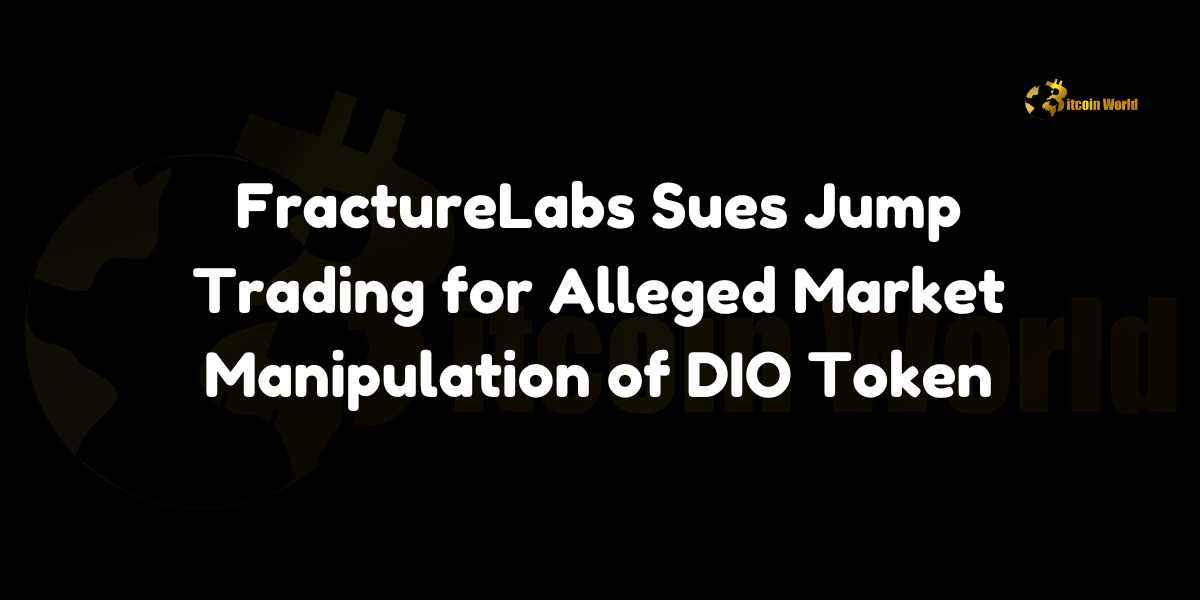FractureLabs Sues Jump Trading for Alleged Market Manipulation of DIO Token
In a significant development within the cryptocurrency and gaming sectors, FractureLabs, the creator of the popular game “Decimated,” has filed a lawsuit against Jump Trading. The lawsuit accuses Jump Trading of manipulating the DIO token, alleging a deliberate “pump and dump” scheme that resulted in a substantial crash of the token’s price following its initial rise during the 2021 sale on HTX. This legal action marks a critical moment in the intersection of blockchain technology, digital assets, and the gaming industry, raising important questions about market integrity and regulatory oversight.
Understanding the Players: FractureLabs and Jump Trading
FractureLabs: Innovators in Crypto Gaming
FractureLabs has garnered attention in the gaming industry for developing “Decimated,” a game that integrates blockchain technology and digital assets to create a unique gaming experience. By leveraging cryptocurrencies, FractureLabs aims to provide players with true ownership of in-game assets and facilitate seamless transactions within the gaming ecosystem. The DIO token, central to this ecosystem, was introduced as part of an initial sale on HTX in 2021, intended to provide liquidity and incentivize player engagement.
Jump Trading: A Major Player in Crypto Trading
Jump Trading is a prominent firm in the cryptocurrency trading space, known for its high-frequency trading strategies and significant influence on various digital asset markets. With a reputation for sophisticated trading algorithms and substantial capital reserves, Jump Trading plays a crucial role in providing liquidity and facilitating market efficiency. However, its aggressive trading tactics have also drawn scrutiny and criticism, particularly concerning market manipulation allegations.
The Allegations: Pump and Dump Scheme
What is a Pump and Dump Scheme?
A pump and dump scheme is a form of securities fraud that involves artificially inflating the price of an asset through false or misleading positive statements to sell the cheaply purchased asset at a higher price. Once the operators of the scheme “dump” their overvalued shares, the price falls, and investors lose their money.
FractureLabs’ Claims Against Jump Trading
FractureLabs alleges that Jump Trading orchestrated a pump and dump scheme targeting the DIO token. According to the lawsuit, Jump Trading intentionally drove up the price of DIO during its 2021 sale on HTX, causing the token’s value to surge to $0.98. Following this artificial inflation, Jump Trading allegedly sold off large quantities of DIO, leading to a dramatic price crash. This sudden drop not only defrauded investors but also breached a price-stabilization agreement, resulting in FractureLabs withholding a $1.5 million deposit from HTX.
Violation of Price-Stabilization Agreement
FractureLabs contends that Jump Trading violated a price-stabilization agreement designed to maintain the token’s value and ensure market stability. This agreement was presumably put in place to prevent excessive volatility and protect investors from manipulative trading practices. The alleged breach of this agreement by Jump Trading undermines investor trust and disrupts the intended economic model of the DIO token within the “Decimated” gaming ecosystem.
The Legal Battle: Seeking Arbitration
Filing the Lawsuit
FractureLabs has initiated legal proceedings against Jump Trading, seeking arbitration to recover the $1.5 million withheld from HTX. Arbitration is a common method for resolving disputes in the financial and trading sectors, offering a private and binding resolution process outside of traditional court systems. FractureLabs aims to demonstrate that Jump Trading’s actions were not only manipulative but also in direct violation of the agreed-upon terms governing the DIO token sale.
Potential Outcomes
The outcome of this lawsuit could have far-reaching implications for both parties and the broader crypto market:
For FractureLabs: A successful lawsuit could result in financial restitution, reinforcing their commitment to market integrity and investor protection. It may also set a precedent for holding major trading firms accountable for manipulative practices.
For Jump Trading: A ruling against Jump Trading could lead to significant financial penalties and damage to its reputation. It may also prompt increased regulatory scrutiny and the implementation of stricter compliance measures within the firm.
For the Crypto Market: This case highlights the need for clearer regulations and stronger enforcement mechanisms to prevent market manipulation and protect investors in the rapidly evolving cryptocurrency landscape.
Implications for the Crypto Gaming Industry
Investor Trust and Market Integrity
The lawsuit underscores the critical importance of maintaining investor trust and ensuring market integrity within the crypto gaming industry. As digital assets become integral to gaming ecosystems, protecting these assets from manipulative practices is essential for fostering a sustainable and trustworthy environment for players and investors alike.
Regulatory Oversight
This legal action may accelerate calls for more robust regulatory oversight in the cryptocurrency and digital gaming sectors. Clear guidelines and enforcement mechanisms are necessary to prevent market manipulation, ensure fair trading practices, and protect investors from fraudulent activities.
Impact on Token Sales and Fundraising
FractureLabs’ lawsuit could influence how future token sales and fundraising efforts are conducted within the gaming industry. Companies may adopt more transparent and regulated methods to raise capital, ensuring that token prices are not subject to artificial manipulation and that investor interests are safeguarded.
Expert Opinions: Analyzing the Case
Blockchain and Legal Experts
Experts in blockchain technology and legal professionals have weighed in on the significance of this lawsuit. They emphasize that the integration of blockchain into gaming brings both opportunities and challenges, particularly concerning market manipulation and regulatory compliance. Strengthening legal frameworks and adopting best practices for token sales are deemed essential for the industry’s growth and legitimacy.
Market Analysts
Market analysts highlight that this case could serve as a bellwether for how similar disputes might be handled in the future. It also draws attention to the influence of large trading firms like Jump Trading on smaller projects and the potential risks associated with their market activities.
Historical Context: Market Manipulation in Crypto
Previous Cases and Precedents
The crypto market has witnessed several instances of alleged market manipulation, including pump and dump schemes, spoofing, and wash trading. These cases have prompted regulatory bodies to increase their focus on enforcing anti-manipulation laws within the cryptocurrency sector.
Impact on Market Dynamics
Market manipulation undermines the fundamental principles of fair trading and can lead to significant financial losses for unsuspecting investors. It also tarnishes the reputation of the crypto market, hindering its adoption and growth.
The Role of HTX in the Token Sale
Platform Responsibilities
HTX, the platform where the DIO token sale was conducted, plays a crucial role in facilitating secure and transparent transactions. As an intermediary, HTX is responsible for ensuring that token sales adhere to regulatory standards and that mechanisms are in place to prevent market manipulation.
Withholding the $1.5 Million Deposit
FractureLabs’ decision to withhold the $1.5 million deposit from HTX is a significant move, indicating a breach of trust and agreement. This action not only impacts the financial standing of Jump Trading but also raises questions about HTX’s role and responsibilities in the token sale process.
Potential Repercussions for Jump Trading
Reputational Damage
Being accused of market manipulation can severely damage Jump Trading’s reputation within the crypto and financial industries. Trust is paramount in trading and investment, and such allegations can deter potential clients and partners.
Financial Penalties
If the lawsuit results in financial penalties, Jump Trading may face substantial losses. Additionally, the cost of legal proceedings and potential arbitration could further strain the company’s financial resources.
Increased Regulatory Scrutiny
A lawsuit of this nature may attract increased attention from regulatory bodies, leading to stricter compliance requirements and oversight. Jump Trading may need to enhance its internal controls and adopt more transparent trading practices to mitigate future risks.
Strategies for Investors Amid Legal Disputes
Diversification
Investors should continue to diversify their portfolios to mitigate risks associated with legal disputes and market volatility. Diversification across different assets and sectors can provide a buffer against potential losses.
Due Diligence
Conducting thorough due diligence before investing in digital assets or participating in token sales is crucial. Understanding the background of the project, the team, and the market dynamics can help investors make informed decisions and avoid falling victim to manipulative practices.
Monitoring Legal Developments
Staying informed about ongoing legal cases and their outcomes can provide valuable insights into market trends and potential risks. Investors should monitor reputable news sources and regulatory announcements to stay updated.
Regulatory Perspectives: Shaping the Future of Crypto Gaming
Need for Comprehensive Regulations
Regulators are increasingly recognizing the importance of establishing comprehensive guidelines for the cryptocurrency and digital gaming sectors. Clear regulations can help prevent market manipulation, protect investors, and foster innovation.
Collaborative Efforts
Collaboration between industry stakeholders and regulatory bodies is essential for developing effective frameworks that balance innovation with investor protection. Initiatives to educate businesses and investors about compliance requirements can contribute to a more secure and transparent market environment.
Global Regulatory Harmonization
Given the global nature of cryptocurrency markets, harmonizing regulatory standards across different jurisdictions is crucial. Consistent regulations can reduce complexity for businesses operating internationally and prevent regulatory arbitrage.
The Future of Digital Assets in Gaming
Integration of Blockchain Technology
The integration of blockchain technology into gaming continues to evolve, offering enhanced security, transparency, and ownership of digital assets. As blockchain becomes more ingrained in gaming ecosystems, the importance of protecting these assets from manipulation and fraud will grow.
Innovative Business Models
Digital assets enable innovative business models, such as play-to-earn, decentralized gaming platforms, and interoperable in-game economies. These models rely on the integrity and stability of digital assets, making regulatory oversight and market integrity
crucial.
Enhanced Player Experiences
Blockchain technology and digital assets can significantly enhance player experiences by providing true ownership of in-game items, facilitating seamless cross-game transactions, and enabling new forms of gameplay and engagement.
Case Studies: Similar Legal Battles in the Crypto Space
BitConnect: A Precedent in Crypto Manipulation
The BitConnect case is a notable example of alleged market manipulation within the cryptocurrency sector. BitConnect was accused of operating a Ponzi scheme, leading to its collapse and significant financial losses for investors. The fallout from this case prompted increased regulatory scrutiny and highlighted the need for robust oversight mechanisms in the crypto market.
Coinbase vs. Bitfinex: Regulatory Disputes
Coinbase and Bitfinex have been involved in various regulatory disputes, highlighting the challenges of operating within the evolving legal landscape of digital assets. These cases emphasize the importance of compliance and transparent business practices to avoid legal repercussions and maintain investor trust.
Potential Outcomes and Their Broader Impact
Restitution and Financial Recovery
If FractureLabs succeeds in its lawsuit against Jump Trading, the financial restitution could serve as a deterrent against future market manipulation. It would also provide a pathway for recovering lost funds, reinforcing the importance of accountability within the crypto market.
Market Confidence
A favorable outcome for FractureLabs could bolster investor confidence in the market, signaling that manipulative practices are being actively addressed. This could lead to increased participation and investment in the crypto gaming sector, driving further growth and innovation.
Regulatory Reforms
The lawsuit may spur regulatory reforms aimed at preventing market manipulation and enhancing investor protection. Clearer guidelines and stricter enforcement can create a more stable and trustworthy environment for digital asset investments.
Conclusion
The lawsuit filed by FractureLabs against Jump Trading for alleged market manipulation of the DIO token represents a pivotal moment in the intersection of cryptocurrency and gaming industries. By accusing Jump Trading of orchestrating a pump and dump scheme, FractureLabs seeks to uphold market integrity and protect investor interests. This legal battle not only highlights the vulnerabilities within the crypto market but also underscores the urgent need for comprehensive regulatory frameworks to prevent such manipulative practices.
As the case unfolds, its implications will resonate across the crypto and gaming sectors, influencing investor behavior, regulatory approaches, and the overall perception of digital assets. For FractureLabs, a successful lawsuit could validate their commitment to maintaining a fair and transparent market, while for Jump Trading, it may necessitate significant changes in trading practices and compliance measures.
Investors and industry stakeholders must remain vigilant, conducting thorough due diligence and staying informed about legal developments to navigate the dynamic and often volatile landscape of digital assets effectively. The outcome of this lawsuit will not only impact the parties involved but could also set important precedents for the future governance and regulation of the burgeoning crypto gaming ecosystem.
To learn more about the innovative startups shaping the future of the crypto industry, explore our latest news article, where we delve into the most promising ventures and their potential to disrupt traditional industries.





